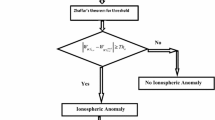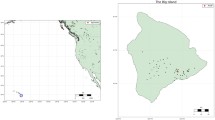Abstract
The level of solar activity and its influence on ionospheric variability has received a focal interest among the ionospheric community. This paper examines the impact of long-term solar activity on the ionosphere over an African equatorial global navigation satellite system (GNSS) station based on a large database of solar and ionospheric datasets. The ionospheric total electron content (TEC) periodic variations, climatology and its relation to solar activity are investigated through wavelet analyses. It is observed that the magnitude and intensity of TEC fluctuations measured by GNSS receivers vary substantially with solar radiation intensity. To probe the processes accountable for the TEC periodicities in the region, the wavelet analysis is undertaken by considering solar indices (solar radio flux and sunspot number) and observed TEC values. The results show a clear strong periodicity of 27 days in the ionospheric TEC, sunspots and F10.7 solar flux power spectra, associated with the sun’s 27 days rotation period. The ultraviolet ray intensity and solar ionization were lower during the solar maximum period (2013 to 2014) of solar cycle 24 compared to the solar maximum period (2001 to 2002) of solar cycle 23, which is the key factor for driving the decreasing trend in TEC between 1999 and 2017. The ionospheric and solar climatology analysis indicates that ionospheric TEC behaviour could be a good indicator of long-term solar activity trend. A large mass of Africa lies within the equatorial and low latitudes making the ionosphere over the region being highly susceptible to low latitude electrodynamics. Results from this study would support the concerted efforts towards developing a reliable regional ionospheric forecasting model for technological applications relying on spaced-based navigation and satellite services.







Similar content being viewed by others
Data availability
The ionospheric-solar effect analysis was done by considering the corresponding F10.7 and sunspot data downloaded from the NASA-OMNI website (https://omniweb.gsfc.nasa.gov/form/dx1.html). The raw GPS datasets are freely available at http://afrefdata.org/. The Global Ionospheric Maps and DCB files are freely available at ftp://ftp.unibe.ch/aiub. The GPS-TEC dataset at the GridPoint (134.05 E and 34.95 N), generated during and/or analysed during the current study are available from the corresponding author on reasonable request.
References
Afraimovich EL, Astafyeva EI, Oinats AV (2008) Global electron content: a new conception to track solar activity. Ann Geophys 26:335–344
Al-Fanek OJS (2013) Ionospheric imaging for Canadian polar regions. University of Calgary
Ansari K, Park K, Kumar S (2019) Acta Astronautica empirical orthogonal function analysis and modeling of ionospheric TEC over south Korean region. Acta Astronaut 161:313–324. https://doi.org/10.1016/j.actaastro.2019.05.044
Chen Y, Liu L, Le H (2008) Solar activity variations of nighttime ionospheric peak electron density. J Geophys Res 113. https://doi.org/10.1029/2008JA013114
Clauer CR, Kim H, Deshpande K et al (2014) An autonomous adaptive low-power instrument platform (AAL-PIP) for remote high-latitude geospace data collection. Geosci Instrumentation, Methods Data Syst 3:211–227. https://doi.org/10.5194/gi-3-211-2014
Dabbakuti JRKK, Peesapati R, Kumar S (2021) Acta Astronautica Modeling and analysis of ionospheric TEC variability from GPS – TEC measurements using SSA model during 24th solar cycle 178:24–35
Davoudifar P, Tabari KR, Shafigh AAE et al (2021) Development of a local empirical model of ionospheric total electron content (TEC) and its application for studying solar-ionospheric effects. Sci Rep 11:1–17. https://doi.org/10.1038/s41598-021-93496-y
Fitzmaurice A, Kuznetsova M, Shim JS, Uritsky V (2013) Impact of Solar Activity on the Ionosphere / Thermosphere during Geomagnetic Quiet Time for CTIPe and TIE-GCM. 1–16
FullerRowell TJ (1998) The “thermospheric spoon”: a mechanism for the semiannual density variation. J Geophys Res 103:3951–3956
Guo J, Li W, Liu X et al (2015) Temporal spatial variation of global GPS derived Total Electron content, 1999–2013. PLoS One 10:1–14. https://doi.org/10.1371/journal.pone.0133378
Guo J, Dong Z, Liu Z et al (2017) Study on ionosphere change over Shandong based from SDCORS in 2012. Geod Geodyn 8:229–237. https://doi.org/10.1016/j.geog.2017.04.003
Hamid NSA, Rosli NIM, Ismail WNI, Yoshikawa A (2021) Effects of solar activity on ionospheric current system in the Southeast Asia region. Indian J Phys 95:543–550. https://doi.org/10.1007/s12648-020-01734-2
Hargreaves JK (1992) The solar-terrestrial environment: an introduction to Geospace-the science of the terrestrial upper atmosphere, ionosphere and magnetosphere. Cambridge University Press, New York, USA
Jamjareegulgarn P, Ansari K, Ameer A (2020) Acta Astronautica empirical orthogonal function modelling of total electron content over Nepal and comparison with global ionospheric models. Acta Astronaut 177:497–507. https://doi.org/10.1016/j.actaastro.2020.07.038
Kintner PM, O’Hanlon B, Gary DE, Kintner PMS (2009) Global positioning system and solar radio burst forensics. Radio Sci 44:RS0A08. https://doi.org/10.1029/2008RS004039
Kumar S, Singh AK, Lee J (2014) Equatorial Ionospheric anomaly (EIA) and comparison with IRI of solar activity model during descending phase (2005- 2009). Adv Sp Res 53:724–733. https://doi.org/10.1016/j.asr.2013.12.019
Kutiev I, Tsagouri I, Perrone L et al (2013) Solar activity impact on the Earth’s upper atmosphere. J Sp Weather Sp Clim 3. https://doi.org/10.1051/swsc/2013028
Liu L, Ning B (2004) Statistical modeling of ionospheric foF2 over Wuhan. Radio Sci 39: RS2013. https://doi.org/10.1029/2003RS003005
Liu L, Wan W, Luan X et al (2003) Solar activity dependence of effective winds derived from ionospheric data at Wuhan. Adv Sp Res 32:1719–1724
Liu L, Wan W, Ning B, Zhang ML (2009) Climatology of the mean TEC derived from GPS global Ionospheric maps. J Geophys Res 114: https://doi.org/10.1029/2009JA014244
Mansoori AA, Khan PA, Bhawre P, et al (2013) Variability of TEC at mid latitude with solar activity during the solar cycle 23 and 24. In: Proceedings of the 2013 IEEE international conference on space science and communication (IconSpace). pp 83–87
Mansoori AA, Khan PA, Ahmad R, et al (2016) Evaluation of long term solar activity effects on GPS derived TEC. J Phys Conf Ser 759: https://doi.org/10.1088/1742-6596/759/1/012069
Motoba T (2009) Long-term data analysis of ionosphere over Syowa Station, Antarctica. J Natl Inst Inf Commun Technol 56:447–463
Mushtaq M, Afridi FAK, Alani SN, Fatima H (2018) Modelling the effects of solar activity on the ionospheric F2 critical frequency over Wakkanai. J Natl Sci Found Sri Lanka 46:527–538. https://doi.org/10.4038/JNSFSR.V46I4.8628
Opperman BDL (2007) Reconstructing ionospheric TEC over South Africa using signals from a regional GPS network. Rhodes University
Peng YX, Scales WA, Hartinger MD, et al (2021) Characterization of multi-scale ionospheric irregularities using ground-based and space-based GNSS observations. Satell Navig 2: https://doi.org/10.1186/s43020-021-00047-x
Prasad SNVS, Rama Rao PVS, Prasad DSVVD et al (2012) On the variabilities of the Total Electron content (TEC) over the Indian low latitude sector. Adv Sp Res 49:898–913. https://doi.org/10.1016/j.asr.2011.12.020
She C, Wan W, Xu G (2008) Climatological analysis and modelling of the ionospheric global electron content. Chinese Sci Bulleti 53:282–288
Sukcharoen T, Jingnong W, Teetat C, Falin W (2017) Comparison of ionosphere at middle latitude zone during solar maximum and solar minimum. Int J Eng Technol 9:262–268. https://doi.org/10.7763/IJET.2017.V9.982
Tsagouri I, Galkin I, Asikainen T (2017) Long-term changes in space weather effects on the Earth’s ionosphere. Adv Sp Res 59:351–365. https://doi.org/10.1016/j.asr.2016.10.004
Xu Z, Hartinger MD, Clauer R et al (2019) Newly established autonomous adaptive low-power instrument platform (AAL-PIP) chain on East Antarctic plateau and operation. Adv Polar Sci 3:362–374. https://doi.org/10.13679/j.advps.2019.0028
Acknowledgments
The authors wish to acknowledge the Regional Centre for Mapping of Resources for Development (RCMRD) for making available the African Geodetic Reference Frame (AFREF) recorded GNSS data, the International GNSS Service (IGS) and the Centre for Orbit Determination in Europe, University of Berne (CODE) for providing the Global Ionospheric Maps, precise ephemeris, DCB data, and the Kyoto World Data Center for the solar indices files.
Funding
The authors declare that no funds, or grants, or other support were received during the preparation of this manuscript.
Author information
Authors and Affiliations
Contributions
Mefe Moses and Sampad Kumar Panda designed the study, implemented the methodology and drafted the manuscript. Joseph D. Dodo, Lazarus M. Ojigi, and Kola Lawal supervised the study and contributed to the overall study design and writing of the manuscript. All authors participated in formulating the idea and in discussing the proposed approach and results. All authors read and approved the final manuscript.
Corresponding author
Ethics declarations
Conflict of interest
The authors declare no conflict of interest.
Additional information
Communicated by: H. Babaie
Publisher’s note
Springer Nature remains neutral with regard to jurisdictional claims in published maps and institutional affiliations.
Rights and permissions
Springer Nature or its licensor holds exclusive rights to this article under a publishing agreement with the author(s) or other rightsholder(s); author self-archiving of the accepted manuscript version of this article is solely governed by the terms of such publishing agreement and applicable law.
About this article
Cite this article
Moses, M., Panda, S.K., Dodo, J.D. et al. Assessment of long-term impact of solar activity on the ionosphere over an African equatorial GNSS station. Earth Sci Inform 15, 2109–2117 (2022). https://doi.org/10.1007/s12145-022-00863-y
Received:
Accepted:
Published:
Issue Date:
DOI: https://doi.org/10.1007/s12145-022-00863-y




